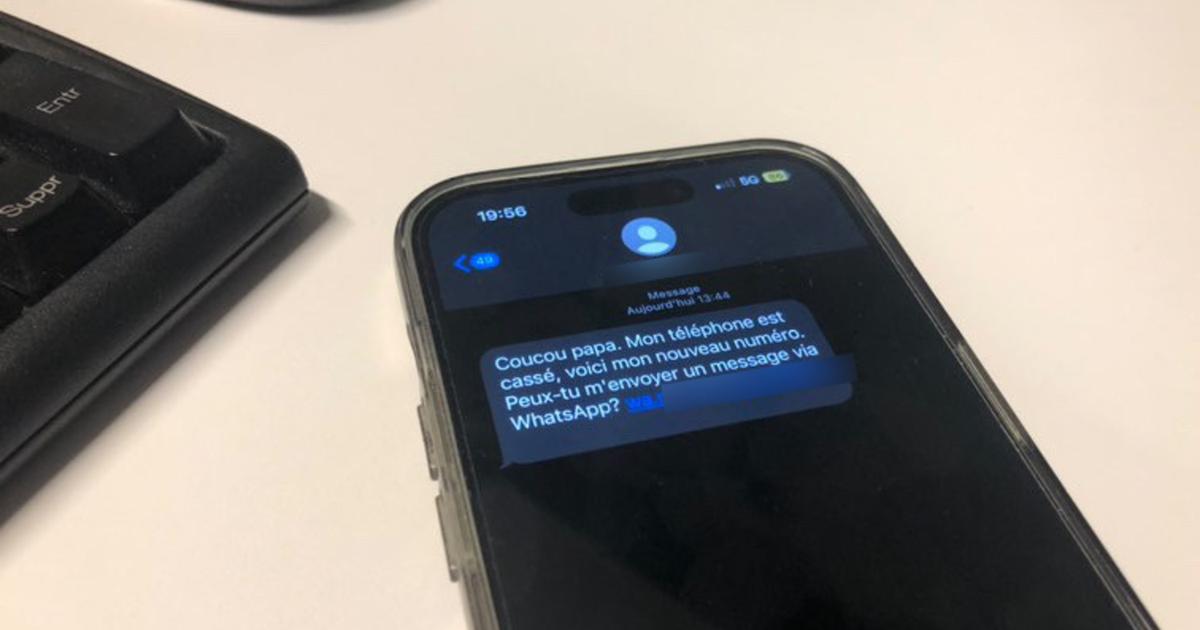The new trendy scam.
Tens of thousands of French men and women have been the target of new fake SMS fraud in recent weeks.
The authorities have called it
the “child who has a problem with their phone scam”
: it consists of making a parent believe that one of their children no longer has access to their supposedly broken or stolen phone. or lost.
After writing
“hello dad”
or
“hello mom”
, the
“child”
then asks his recipient to contact him on a new number.
Sometimes it directly sends a link redirecting to a new discussion on the WhatsApp messaging application, known to be encrypted and therefore more difficult to trace by the authorities.
Prepaid coupons
When the victim is hooked, the scammer begins a message discussion.
Generally, the aigrefins on the line avoid voice discussion, claiming a microphone problem or cellular network unavailability.
Rarely, some go beyond these excuses and respond to their targets' calls, imitating a child's voice.
The fact remains that after a few minutes they demand money for different reasons: purchase of a new phone, debt, blocked bank account... They thus demand the credit card number of their target, or a payment coupon code (PCS, Transcash, Neosurf), very common in the online scam sector.
“Do not respond”
,
“never send money before having formally identified your interlocutor”
and
“call your child directly on their telephone number to confirm the message received”
, the authorities recommend in the face of this scam on the website cybermalveillance.gouv.fr.
This scam initially caused a furore in Australia.
By the end of 2022, 11,000 residents of the country had lost a total of $7.2 million due to this scam, according to police.
But this type of fraud generally affects the entire West, including France, in line with older deceptions, such as love scams via social networks or false emails usurping the authority of the State.
Produced from abroad
Generally developed from abroad - in West Africa in the case of grazers, these hierarchical cybercriminals installed in public cybercafés, or in Eastern Europe by branches of groups specializing in various trafficking - these scams require in-depth knowledge of the habits and customs of the target countries.
This is what we call
"social engineering"
, or the art of psychologically manipulating one's interlocutors by exploiting one's cultural references, as Pierre Penalba, a police
officer
specializing in cybercrime and co. -author, with his wife Abigaelle Penalba, of
Darknet, the scary journey
(Albin Michel, 2022).
They also require a solid background in IT.
To target you, the crooks will have to obtain personal databases, available on the black market after hacking e-commerce sites, telephone operators, applications, etc. These include the telephone number, email, name and gender of potential victims.
This last criterion is essential for scammers, since it will allow them to decide between the use of
“hello dad”
or
“hello mom”
in fraudulent SMS messages..
.
From there, the criminals invest in tools for sending mass SMS and emails, which are legal and used by traditional companies.
This makes it possible to automate the sending of tens of thousands of messages in record time, hence the number of French people who have already received this SMS.
If you have been the victim of this
“child who has a problem with their phone” scam,
the authorities advise you to immediately object to your bank in the context of bank transfers, file a complaint and keep the evidence.
“To be advised in your efforts, contact the Info Escroqueries platform of the Ministry of
the Interior at 0 805 805 817 (free call and service)
,” specify the authorities at cybermalveillance.gouv.fr.

